We made an early start to Kantolomba and got through the road block with no delay. Whew. Arriving at the building, we realized communication had taken another hit. The floor was all wrong. We had heard something about Gibson wanting to level the floor because the concrete slab was uneven; the solution he'd come up with was to raise the floor by about four inches. This would require many, many bags (or pockets as they're called here) of concrete and would cost a fortune with no worthwhile result. The odds are very good that the floor would still be uneven, plus we would have a real problem in the doorways. After much discussion we reached an understanding and the team began to scrape the cement from four inches thickness to a little over one inch in depth. This is plenty to create a smooth surface for the floor.
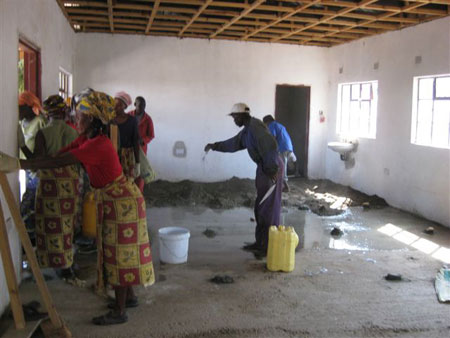
The cement piles around the floor are the markers Gibson had set out to determine the level of the floor.
Theresa told us later that she had expressed a concern to Gibson about the thickness of the concrete, but he was quite forceful in his opinion that his was the proper way to go. She held her ground, saying they would wait until we arrived to make a final decision. Somehow, though, there was enough of a misunderstanding that the first part of the job, a storage room off of the main room, was done with the four inch coating. Fortunately, that too could be scraped off and transferred to the large room with no problem. It was, however, a great deal of extra work.
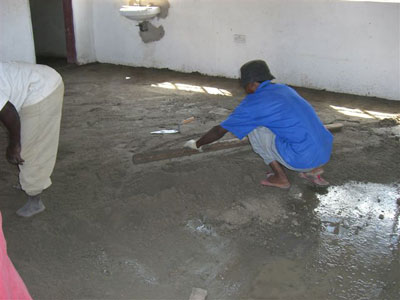
Christopher scraping off the extra cement.
Within minutes of observing the process it became clear that the crew needed another approach. The concrete was mixed and carried into the room by the women, then everyone stood around waiting while Gibson spread the cement. We encouraged him to teach Christopher how to do what he was doing so Gibson could act as supervisor, enabling many more people to participate and the work to go faster. He moved into his new role and all was much smoother. The next suggestion was that rather than having the men do the floor while the women mixed concrete and hauled it into the building, the women could also learn to do the more technical aspects. Soon everyone was doing all the jobs and looking like a well-oiled floor-making machine.
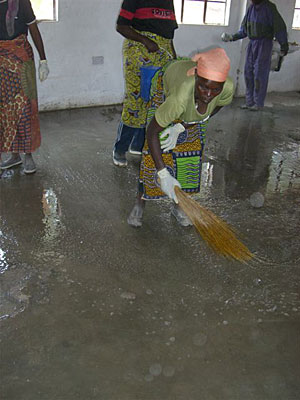
Sweeping ahead of the cement crew.
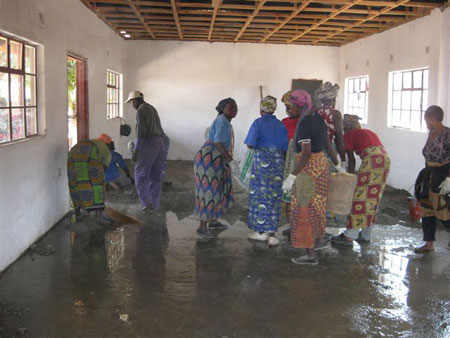
The women move in to assist.
There were far too many folks for the number of tasks so we asked the gals from the sewing cooperative to take on a sewing project. While we were discussing the design for the skirt they would be making, we had a little impromptu coaching session on the importance of speaking English while at work. These four gals are the best English-speakers in the organization. We explained to them the importance for themselves, for the rest of the cooperative, and especially for the children of becoming proficient and comfortable with speaking English. These women can set the tone, be the role models, and teach and encourage the rest of their cohorts who have no English at all. They agreed to take it on. We also put a great deal of pressure on Theresa, who has the best English of all, to hold everyone to this agreement.
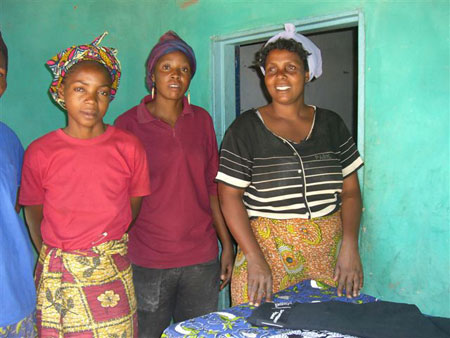
The sewing team.
Next we met with Pascal, one of the carpenters, with a request to create a temporary structure that would support a chitenge "door" for the new bathrooms. With pictures and pieces of wood, we explained what we wanted. He asked about reinforcing it and putting in extra supports. "No, we don't need that. We just want this simple, three-board design."
No problem.
Back to town for two more pockets of cement and, while we're at it, a couple of toilet bowl brushes and some cleanser. When the plumber tested the pipes a while back, he failed to drain the toilet afterward and the water sitting in the bowl has stained it. Theresa wanted a cleanser to remove the stain. Of course, we went to Sanjay. To our horror we found that what people use to get rid of those stains is acid. "Surely you don't mean acid acid? Isn't that terribly dangerous?" "Oh, yes." This followed by stories of trucks filled with acid crashing, the acid spilling everywhere, the commitment to cleaning up the damage, the regular failure to do so. Despite our very convincing arguments against this course of action, the acid was purchased. This is one of those, "you can't come into someone else's culture and dictate your standards" moments. Ah, but it is hard.

Ready for cleaning.
We sent Muyunda back to Kantolomba with the supplies while we had a lunch meeting with Theresa. It is surprisingly hard to find enough quiet moments in the day to discuss issues and make decisions about next steps.
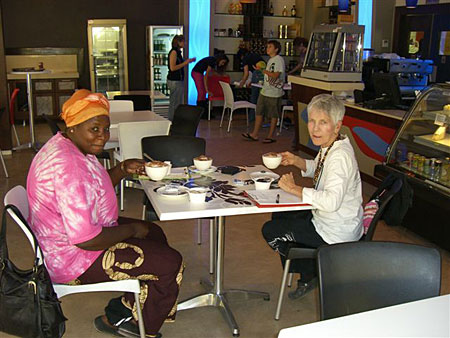
A business lunch.
After lunch we returned to Kantolomba and found they were making excellent progress on the floor. Even though we see it every day, it remains hard to grasp that these people can work as they do. This is hard, hard labor and they do it hour after hour. We try to get them to take a break or knock off for the day, but they won't hear of it. And, they seem so happy! Theresa says, "We told you we could finish this building ourselves!" No kidding. The next building these folks will do from start to finish. Having a licensed contractor for the current building netted us a huge price tag and endless headaches. The people in the community just show up, go to work, and get it done.
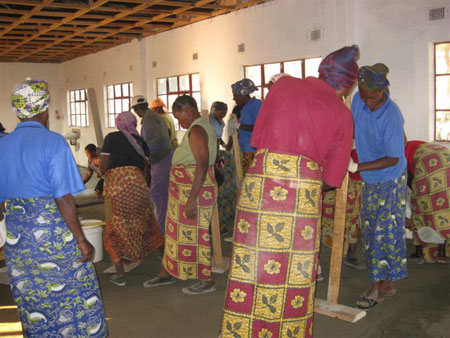
A serious team effort.
Next, we checked in on the temporary bathroom doors and, to our disappointment, found a complex structure that incorporated all the features we told the carpenter we did not want. With this one, Theresa was out of patience. Twice in one day she had asked someone to do something a particular way, and they went off on their own to do exactly the opposite of what she asked. (For those of you familiar with Zen training, you know how unpopular "better ideas" are in Zen awareness practice. Apparently, they're starting to be just as unpopular with Theresa.) It sounded as if she was quite clear about the instructions this time (and surprisingly loud!), sending him off to dismantle his design and build what he was asked to build. Theresa is realizing that if her authority is ever to be accepted by the men she must learn to stand her ground.
Our last stop was a visit to the new volunteers making peanut butter for tomorrow's lunch. A mortar, a pestle, and a heap of "ground nuts" were slowly, with a lot of muscle behind that pestle, turning into an impressive batch of chunky peanut butter. The new gals are already trained to cook lunch for the children, freeing up the old-timers to work on the building and do other tasks.
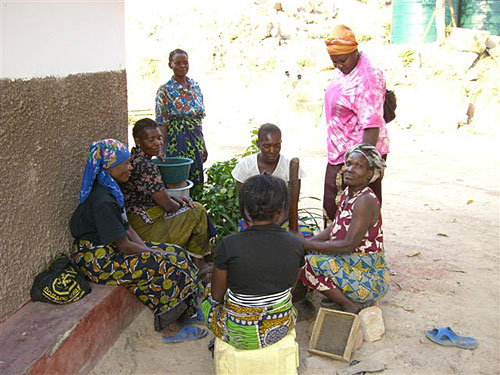
Making peanut butter.
As the women worked, Jen did another commercial for English practice while tasks were accomplished. "What are you doing?" "I am making peanut butter." We often wonder what they're actually thinking, as we go on about whatever it is that is important to us in the moment. However, we did get a delighted response to our efforts to practice our Bemba as they're practicing their English when, with a heartfelt twatotella (thank you) and an enthusiastic tukamanna milo (see you tomorrow), we took our leave.
Tukamanna milo and gassho
